Sweepstakes Laws Explained: Why No Purchase Is Ever Necessary
Understanding the legal framework behind legitimate sweepstakes and why the "No Purchase Necessary" rule protects consumers while ensuring fair competition.
If you've ever entered a sweepstakes or contest, you've undoubtedly seen the phrase "No Purchase Necessary" prominently displayed. But have you ever wondered why this seemingly simple statement is so crucial? The answer lies in a complex web of federal and state laws designed to protect consumers from illegal gambling while ensuring fair access to promotional opportunities.
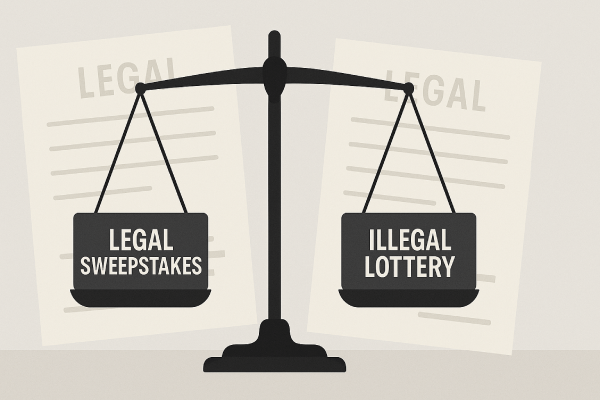
Understanding sweepstakes laws isn't just important for businesses running promotions—it's equally valuable for consumers who want to participate safely and know their rights. Let's dive deep into the legal landscape that governs these promotional activities.
The Three Elements That Define Illegal Gambling
To understand why "No Purchase Necessary" is so important, we first need to understand what makes something illegal gambling under U.S. law. For an activity to be considered gambling (and therefore potentially illegal in most contexts), it must contain three specific elements:
1. Prize (Something of Value)
This element is straightforward—there must be something of value offered to participants. This could be:
- Cash prizes: Direct monetary rewards
- Physical products: Electronics, gift cards, merchandise
- Services: Free subscriptions, consultations, or experiences
- Discounts or credits: Even promotional benefits count as prizes
2. Chance (Random Selection)
The winner must be determined by luck rather than skill. Examples include:
- Random drawings: Names pulled from a hat or digital equivalent
- Number matching: Lottery-style number selection
- Random timing: Being the 100th caller or visitor
3. Consideration (Payment or Value Exchange)
This is where the "No Purchase Necessary" rule becomes critical. Consideration means participants must give something of value to enter, such as:
- Money: Direct payment for entry
- Purchase requirement: Buying a product to enter
- Significant effort: In some jurisdictions, requiring substantial time or effort
- Personal information of value: Though this is more complex legally
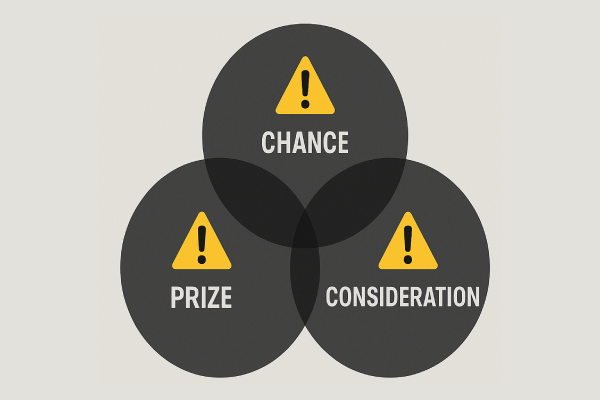
The key insight: When all three elements are present, the activity becomes a lottery, which is heavily regulated and can only be operated by government entities in most U.S. jurisdictions.
How "No Purchase Necessary" Removes the Consideration Element
By offering a free method of entry that provides equal chances of winning, sweepstakes organizers eliminate the "consideration" element, transforming what would be an illegal lottery into a legal promotional sweepstakes.
Legal Methods of Free Entry
The law requires that free entry methods be equally accessible and provide the same chances of winning as paid entries. Common approaches include:
- Mail-in entries: Send a postcard with required information
- Online form submission: Free digital entry through website
- In-person entry: Visit a physical location to enter
- Phone entries: Call a toll-free number (not premium rate)
- Email entries: Send entry information via email
Important: The free method cannot be significantly more difficult or time-consuming than the purchase method. Courts have struck down sweepstakes where the free entry process was deliberately burdensome.
Federal Laws Governing Sweepstakes
Sweepstakes in the United States are primarily governed by federal laws administered by several agencies:
Federal Trade Commission (FTC) Regulations
The FTC oversees truth in advertising and consumer protection:
- Truth in Advertising: All claims about prizes must be accurate
- Material Disclosure: Important terms must be clearly stated
- Deceptive Practices: Cannot mislead consumers about odds or requirements
- Privacy Protection: Must handle personal information responsibly
Federal Communications Commission (FCC) Rules
When sweepstakes involve broadcast media or telephone systems:
- Broadcast Disclosures: Radio and TV promotions need specific announcements
- Telephone Regulations: Rules for phone-based entry systems
- Equal Access: Ensuring fair access across different media
United States Postal Service (USPS) Regulations
For promotions using mail systems:
- Mail Fraud Prevention: Prohibits deceptive mailing practices
- Proper Addressing: Requirements for mail-in entry processing
- Delivery Standards: Ensuring entries reach organizers
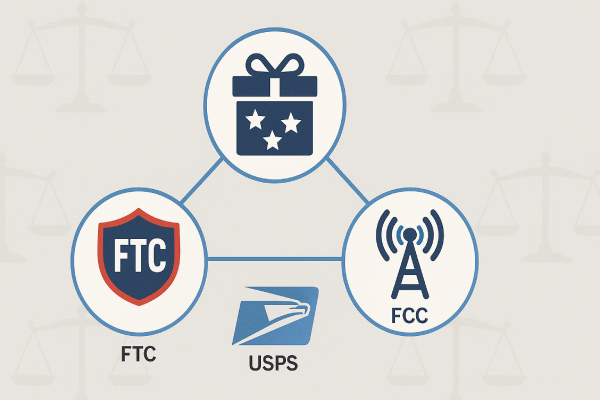
State-Level Variations and Compliance Challenges
While federal law provides the foundation, each state has its own additional requirements, creating a complex compliance landscape for national sweepstakes.
Registration and Bonding Requirements
Several states require advance registration and bonding for large-value sweepstakes:
- Florida: Registration required for prizes over $5,000
- New York: Registration for prizes over $5,000, bonding may be required
- Rhode Island: Registration for prizes over $500
- Tennessee: Registration requirements for certain promotional activities
Prohibited Jurisdictions
Some states have restrictions that effectively prohibit certain types of sweepstakes:
- Quebec, Canada: Requires skill-testing questions
- Certain U.S. territories: May have additional restrictions
Age and Residency Requirements
Most states allow organizers to set reasonable restrictions:
- Minimum age: Typically 18+ (though some allow 13+ with parental consent)
- Geographic limitations: Can exclude certain states for legal compliance
- Employee exclusions: Preventing conflicts of interest
Why These Laws Exist: Consumer Protection in Practice
Sweepstakes laws aren't arbitrary bureaucratic requirements—they serve important consumer protection purposes that have evolved over decades of legal precedent.
Preventing Predatory Practices
Historical abuses led to current regulations:
- False Prize Claims: Companies advertising non-existent prizes
- Hidden Costs: Requiring expensive purchases for "free" entries
- Targeting Vulnerable Populations: Exploiting elderly or financially desperate individuals
- Data Harvesting Schemes: Using fake contests to collect personal information
Ensuring Fair Access
Laws guarantee equal opportunity regardless of economic status:
- Economic Equality: Wealthy participants can't buy better odds
- Geographic Fairness: Rural participants aren't disadvantaged
- Technological Access: Alternative entry methods for those without internet

How Legitimate Companies Ensure Compliance
Reputable organizations take comprehensive steps to ensure their promotional activities comply with all applicable laws.
Legal Review Process
Before launching any sweepstakes, responsible companies:
- Engage Legal Counsel: Work with attorneys specializing in promotional law
- Multi-State Analysis: Review requirements for all target jurisdictions
- Risk Assessment: Evaluate potential legal and business risks
- Documentation Review: Ensure all rules and disclosures are compliant
Implementation Safeguards
During sweepstakes operation:
- Independent Administration: Third-party companies often handle entry processing
- Audit Trails: Detailed records of all entries and selection processes
- Random Selection Verification: Using certified random number generation
- Winner Verification: Confirming eligibility before prize award
Transparency Measures
Building trust through openness:
- Clear Official Rules: Comprehensive terms accessible to all participants
- Odds Disclosure: When required, providing accurate probability information
- Winner Announcement: Publicly identifying winners (with consent)
- Customer Support: Accessible help for participant questions
Red Flags: Identifying Illegal or Fraudulent Schemes
Understanding legitimate sweepstakes laws helps consumers identify and avoid fraudulent schemes that violate these protections.
Common Warning Signs
- Required Payment: Demanding money, purchase, or premium-rate calls to enter
- Pressure Tactics: "Limited time" pressure without legitimate deadlines
- Vague Prize Descriptions: Unclear or unrealistic prize claims
- Request for Bank Information: Asking for account details "to deposit winnings"
- Poor Communication: Unprofessional websites, emails, or phone interactions
- No Official Rules: Legitimate sweepstakes always have detailed terms
Verification Steps
Before participating in any sweepstakes:
- Research the Company: Verify the organizer's legitimacy and reputation
- Read Official Rules: Understand all terms and conditions
- Confirm Free Entry: Ensure no-purchase options are clearly available
- Check Registration: For large prizes, verify state registration if required
- Trust Your Instincts: If something feels wrong, investigate further
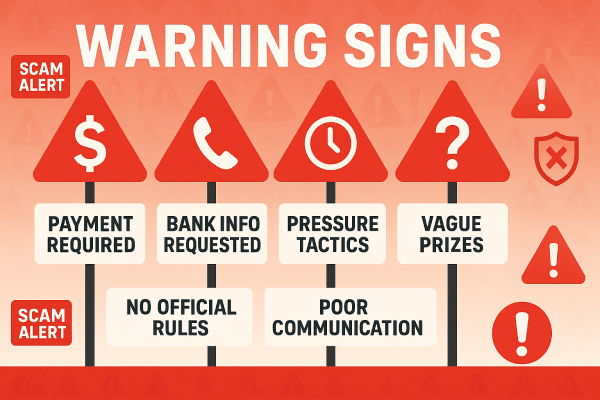
The Role of Technology in Modern Sweepstakes Compliance
Modern technology has both simplified compliance and created new challenges for sweepstakes organizers.
Digital Advantages
- Automated Compliance Checking: Software can verify rule compliance across jurisdictions
- Secure Random Selection: Cryptographically secure random number generation
- Audit Trail Creation: Digital records of all entries and processes
- Real-time Monitoring: Immediate detection of suspicious activity
New Challenges
- International Participation: Global internet access creates jurisdiction complexity
- Data Privacy Laws: GDPR, CCPA, and other privacy regulations
- Social Media Integration: Platform-specific rules and limitations
- Mobile Access: Ensuring equal access across different devices
How MegaEntry Ensures Full Legal Compliance
At MegaEntry, we take legal compliance seriously, implementing multiple safeguards to protect both our participants and our business:
Our Compliance Framework
- Legal Counsel: Regular consultation with promotional law specialists
- Multi-State Registration: Proper registration in all required jurisdictions
- Free Entry Methods: Always available with equal winning chances
- Transparent Rules: Clear, accessible official rules for all promotions
- Independent Verification: Third-party random selection verification
- Privacy Protection: Strict data handling and privacy safeguards
Participant Protections
- Phone Verification: Ensures legitimate winners while preventing fraud
- Clear Communication: All terms explained in plain language
- Customer Support: Accessible help for questions or concerns
- Fair Play Monitoring: Anti-cheat systems for skill-based games
What This Means for You as a Participant
Understanding sweepstakes laws empowers you to participate confidently and safely in legitimate promotions while avoiding fraudulent schemes.
Your Rights as a Participant
- Free Entry Access: Always have a no-purchase method available
- Clear Information: Access to complete rules and terms
- Fair Treatment: Equal chances regardless of entry method
- Privacy Protection: Reasonable use of your personal information
- Timely Prize Delivery: Receive winnings as promised in official rules
Best Practices for Safe Participation
- Never pay to enter: Legitimate sweepstakes are always free
- Read the rules: Understand all terms before participating
- Verify legitimacy: Research unfamiliar companies before entering
- Keep records: Save confirmation emails and entry documentation
- Report fraud: Contact authorities if you encounter suspicious activities
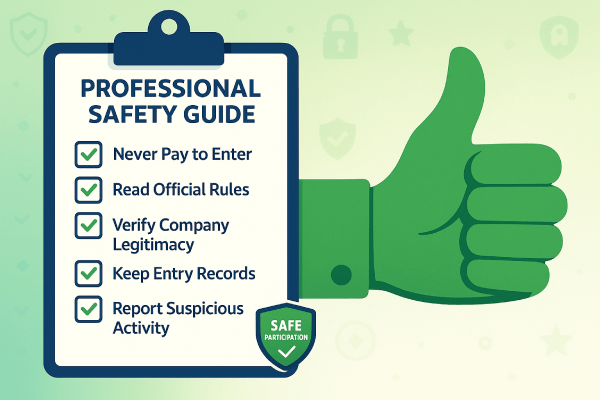
The Future of Sweepstakes Regulation
As technology evolves and consumer behaviors change, sweepstakes laws continue to adapt:
Emerging Trends
- Digital Privacy Focus: Increasing emphasis on data protection
- Social Media Integration: New rules for platform-based promotions
- Blockchain Transparency: Using technology for verifiable random selection
- Global Harmonization: Efforts to standardize international promotional laws
Ongoing Challenges
- Cryptocurrency Prizes: Regulatory uncertainty around digital assets
- Artificial Intelligence: Ensuring fair algorithms in automated systems
- Cross-Border Commerce: Managing multinational promotional compliance
Conclusion: Knowledge Is Your Best Protection
The "No Purchase Necessary" requirement isn't just a legal formality—it's a fundamental consumer protection that ensures fair access to promotional opportunities regardless of economic status. By understanding the legal framework behind legitimate sweepstakes, you're better equipped to:
- Participate safely in legitimate promotions
- Identify and avoid fraudulent schemes
- Understand your rights as a participant
- Make informed decisions about promotional activities
At MegaEntry, we're committed to operating within the highest standards of legal compliance while providing exciting opportunities to win amazing prizes. Whether you prefer traditional giveaway entries or skill-based gaming competitions, you can participate with confidence knowing that every aspect of our platform adheres to federal and state regulations.
Ready to put this knowledge into practice? and experience a fully compliant, fair, and transparent promotional platform where your safety and enjoyment are our top priorities.
This article is for informational purposes only and does not constitute legal advice. Sweepstakes laws can be complex and vary by jurisdiction. For specific legal questions, consult with a qualified attorney specializing in promotional law.
Experience Legal, Fair Sweepstakes
Join MegaEntry for fully compliant giveaways and skill-based games with transparent rules and real prizes!
